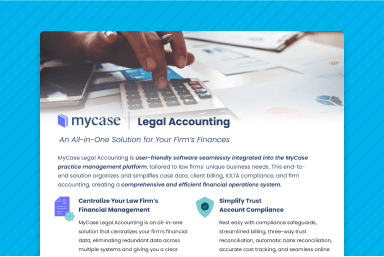ABA Techshow 2021 Visual Notes: Responding to Online Disinformation

Three decades ago, the internet was not well-traversed and very few people even knew it existed. Fast forward to 2021 and it’s an entirely different story. We live in a digital world now, and the internet is central to many aspects of our personal and business lives. These days we communicate, interact, purchase goods and services, and get work done online.
Because we spend so much time on the internet, social media and websites have become increasingly important parts of our purchasing cycles, whether we’re in the market for goods or services. In fact, most consumers use the internet to conduct research prior to making important purchasing decisions, and online reviews from actual customers have become central to the decision-making process. Using these reviews, consumers are able to make more informed decisions when making purchasing decisions about products or services.
While these reviews are great for consumers, navigating the world of online reviews can be tricky for business owners, including lawyers, since responses to reviews – both negative and positive – are decidedly public. A particularly troublesome issue for some lawyers is when former clients – or even potential clients who haven’t yet retained a lawyer’s services – post reviews that are not grounded in fact. This confounding reality can present problems for lawyers seeking to respond to negative online reviews since doing so can detrimentally impact their online presence and can sometimes trigger ethics rules regarding confidential information as well.
Fortunately, there are ethics opinions available that offer guidance for lawyers to help them successfully navigate this challenging dilemma, and I’ll share information about one of the most recent opinions at the end of this post.
But first, let’s take a look at the overall phenomenon of the spread of misinformation online. Conveniently, this topic was recently covered in a Keynote at ABA Techshow, which occurred earlier this month. The conference was virtual this year, and on the third day of the conference, Renée DiResta discussed the role that technology platforms and algorithms play in the proliferation of disinformation and conspiracy theories and how to mitigate online misinformation.
Below you’ll find the 3 things you need to know:
Bots
Because law firm consumers are online and likely reading reviews about your firm on Yelp and other sites, it’s important to be aware of the influence of bots. As DiResta explained, bots are increasingly commonplace. Bots interact on a variety of different sites and do so based on the outcomes desired by the person who programmed the bot. And because bots are essentially machines interacting online, they can do so far more efficiently and effectively than their human counterparts, whether they’re leaving negative reviews for your law firm or tweeting inflammatory statements designed to swing an election.
DiResta explained that bots have the potential to be very impactful and there are real world examples of this. For instance, as we all know, bots impacted national politics during the last election cycle. Similarly, bots can often capitalize on trending social media hashtags and the end result can be to sway public opinion about whatever topic the bot is programmed to address. As a result, bots are a primary example of a force that can have a drastic impact on public perception and lawyers should therefore be acutely aware of their existence and potential.
Bolstering online transparency
One end result of the impact of bots and the spread of misinformation online is the increased focus on increasing transparency on social networking platforms and elsewhere online. DiResta pointed out examples of social media sites taking steps to bolster online transparency, such as Twitter’s effort to reduce the number of and efficacy of bots on the platform. Even more notable are efforts to pass legislation, some of which have been successful, that would ban bots or provide more transparency regarding their use. Once example is the recent legislation passed in California that would require bots to “identify themselves.“
For lawyers, the most important takeaway is that bots exist, and can be used to spread disinformation. Understanding how bots work and how they’re being used to impact access to factual information online is a key piece of knowledge that lawyers need to file away as part of their ethical duty to maintain technology competence, since a large part of meeting that duty is staying abreast of changes in technology and understanding how they might impact the practice of law.
Cross platform participatory misinformation
Another important issue addressed by DiResta during her Keynote was how misinformation can be spread across multiple online platforms, thus amplifying the deception. She offered a number of different examples of how this occurs “in the wild’:
- Online trolls spread conspiracies about companies across platforms
- “Influencers” echo the misleading claims
- Likeminded online groups collaborate to spread the misinformation on multiple social media sites
- Hashtags go viral and are unintentionally promoted by uninvolved social media users
- The media gets wind of the claims and amplifies the deceptive claims
For lawyers, it’s important to understand how this happens and how to avoid being an unwitting participant – or the victim – of this type of misinformation spread. Again, that’s where compliance with the ethical duty of technology competence comes in. Knowledge is power – and knowledge of technological advances that can impact the spread of misinformation is part of your ethical responsibility as a lawyer.
The legal ethics of reputation management
And last but not least, as promised, let’s move on to how to respond when your law firm is the victim of a misinformation claim. It’s never an easy issue to address, but fortunately there is recent guidance available for lawyers faced with negative online reviews, some of which may be based on false information.
A few months ago, the American Bar Association released Formal Opinion 496, in which it provided guidance and best practices for lawyers when it comes to ethically responding to negative online reviews. You can read the entire opinion for the ABA’s analysis of the ethical issues presented when lawyers decide whether to respond to online reviews. In the meantime, the ABA offered the following guidance for lawyers who choose to move forward with responding:
- Attempt to move the conversation offline with a response such as “Please contact me by telephone so that we can discuss your concerns”
- Respond online as follows:“Professional obligations do not allow me to respond as I would wish
- If you do ultimately choose to respond online, you must avoid disclosing “information that relates to a client matter or that could reasonably lead to the discovery of confidential information by others.”
Finally, for even more information on reputation management and advice on how to protect your law firm, make sure to download this FREE guide: “Online Reputation Management for Lawyers: A Checklist.”


